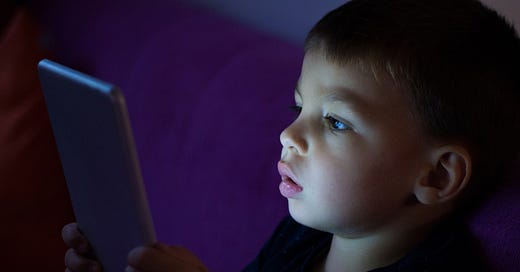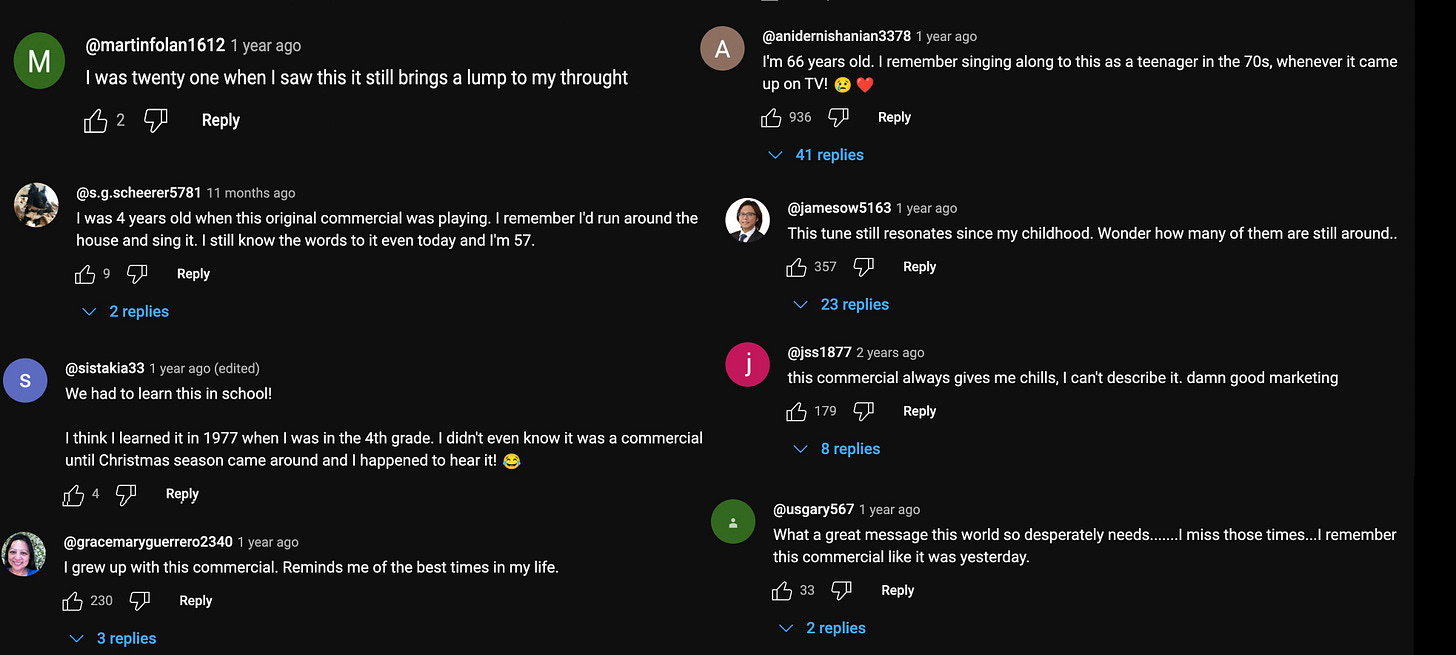Screenshy
"Screentime" is the latest in a long line of moral panics around children and new media technology. Is it different this time?
If you’re a parent, you’ve surely heard or participated in the debate about “iPad kids” and the dire threat they pose to America. Even if you’re not a parent, you’ve seen plenty of iPad kids in the wild, blissed out in a restaurant while their parents gab (or poke at their own screens, likely as not). People aren’t imagining it — normal parents really are giving their kids free rein with personal screens from infancy. It’s happening, it’s real. The only remaining question is whether it matters.
Our elites certainly seem to think it does. Mark Zuckerberg is raising his children in a lavishly appointed lead-lined box in Oahu to shield them from the perverse influence of electromagnetic waves. The Zuckerberg-Chan kids encounter no technology more advanced than a butter churn, and their only sources of entertainment are mummery shows, perhaps the occasional puppet theater. All analog, and all rigorously vetted by Priscilla and her crack team of child development experts. And it’s not just the top of the elite pyramid who cares about this, there’s a pronounced down-market gradient in who gives personal screens to their kids. You don’t need me to tell you this — there’s something undeniably déclassé about a young kid poking at a screen while his college-educated mom ignores him. There’s a new and urgent concern about the potentially malign influence of such exposure that the Boomers and Gen Xers barely registered when plunking their own spawn in front of television for their state-mandated 6 hours of daily consumption. Even to those of us raised by television, this feels different.
Is it?
Television was the third mass media paradigm after print and radio, and it’s difficult to understate how compelling the introduction of moving pictures made the medium. The Boomers were the first generation exposed to it in childhood, and we are all arguably living through the results of exposing an immunologically naïve population to compulsive new media technology — and we will be for the next 20ish years until the last Boomers finally depart us like elves leaving Middle Earth. Spend a second reading the comments Boomers wrote on the video for this 1971 Coca Cola advertisement.
So yes, television had a profound psychic impact on previous generations and our own. But even as powerfully as television tapped into a new emotional conduit, it still had a social commonality that drew people together, everyone watching the same shows and absorbing the same narratives. The Boomers started with three channels if they were lucky, and even most millennials grew up with a couple dozen in practice. Even after personal video recorders like TiVo became popular, for the most part television remained a broadcast technology — you watched a show when it aired, or you didn’t see it, each program an event it was possible to miss.
This is one way internet-connected personal screens are actually categorically different from what came before: they allow the user to escape into a private media bubble tailored to their own preferences, on their own schedule, completely divorced from any communal media reality their peers might recognize. Yes, you can share clips with friends, and the occasional viral video might achieve some level of shared notoriety, but the sense of live media being an event that you might feel you missed out on it if you didn’t catch it as it happened is gone forever. With the exception of major sporting events and a few blockbuster films, and a couple generational shows like Game of Thrones, there are simply no more “water-cooler conversations” about entertainment media as when Ross kissed Rachel, everyone breathlessly discussing the same thing they saw last night. The conversations we have about media are fragmented recommendation swaps with no immediacy. Did you catch the latest on Apple TV? No hurry, it’s on my list.
And probably more importantly than the loss of shared social context, personal screens provide a degree of self-directed diversion that strikes many of us, myself included, as downright spooky. No older form of media, including channel-flipping on television, can possibly compete with TikTok and other short-form content platforms in its ability to suck away time and attention. Having been on the receiving end of this technology with a fully-developed frontal lobe, it doesn’t seem at all far-fetched that this form of media could train developing brains to give up on anything that doesn’t pay immediate dividends in dopamine, encouraging a young user to scroll away and context switch at the first sign of boredom or difficulty. Even earlier generations of video games, which scared plenty of moms in their ability to monopolize their kids’ attention, required a commitment, an expected level of perseverance, totally alien to modern digital media.
Jonathan Haidt, author of The Anxious Generation, has done the research and convinced himself that teen phone use and social media in particular is responsible for the recent dramatic decline in mental health among young people — his arguments have been covered extensively elsewhere, so I won’t belabor them here as well — but more recently he’s turned his focus to exactly this problem of attention that he thinks a personal screen engenders. Give it a listen, I find his arguments compelling.
But isn’t this exactly what out-of-touch adults in the past said about every new form of media? Weren’t there these same dire warnings about novels, and comic books, and radio programs? Didn’t it all amount to nothing?
A few extreme outliers notwithstanding, isn’t this just another moral panic? After all, the simplest argument for not worrying about giving kids screens is very straightforward and relatively persuasive: they’re going to live in a world where these devices exist and they’ll own one themselves as adults. Why shouldn’t they get used to the realities of that world when they’re kids? There’s even a granola, free-range-kid aspect to this line of argument: the real world may not be amenable for unsupervised physical exploration to an eight-year-old anymore, but the digital world could be, and is pretty safe. Why not let them roam online?
I’ll admit to being torn on this point. I had more physical freedom at my children’s ages than they do, not due to my own fears and preferences but due to the changing social reality they inhabit. Not only might some nosey neighbor call the police on my kids if they catch them unattended at the park, where are they supposed to go, and with whom? Most of their friends have organized activity calendars that book them from when school lets out straight through till bedtime. At the same time, a lot of their peers have had iPhones or Apple watches with messaging tech since the age of eight. To deny my kids the same technology, which is what we’ve decided so far, is to relegate them to a second social class. Some of their peers message each other digitally all day long, passing notes my kinds can’t receive. And it gets worse the older they get, where lack of social media is, if not a kind of social suicide, at least social segregation, forced to sit with the other weird kids. Could it really be so bad to take them off the digital leash?
I don’t know. I genuinely struggle with this question. My kids are still relatively young, so the most intense social pressure is yet to arrive. And norms around adolescent phone use, especially at school, are changing fast. Maybe not fast enough to save my kids from being pariahs if my wife and I stay firm on this point, but one can hope.
For now, our approach to personal screens remains more cautious (one might say outright paranoid) than most people we know. We have no problem with TV shows and movies that we choose for them — they have an extensive library I’ve pirated for them, and they’re free to watch it together on the big screen in the living room. They can watch just about anything they dig up on the Kids section of Netflix. We’re not particularly strict with time limits, although they surely watch less than I got away with at their age. They have old Nintendo hand-held game consoles to play video games on, and they join me on the modern TV-based consoles on occasion. But the iPads1 only come out on plane rides, and they never get to play with our phones.
And I worry that’s needlessly restrictive, that we’re denying them some harmless fun and social experiences, that we’re just as irrational as the parents wringing their hands about the satanic influence of Dungeons and Dragons in the 80s. But then I’ll see a YouTube video of a 5 year old playing Minecraft on one screen while scrolling TikTok on a second, and I know that whatever mistakes we’re making, things could be a lot worse.
They’re actually incredibly shitty Amazon Fire tablets we bought for like $50 each. One of the nice things about using them infrequently is we don’t care that they’re so much worse than a real Apple product.






A few weeks ago I was a boyfriend brought along to a dinner with a bunch of young lady doctors and the urban millenial men that love them. We're all at the age where kids are starting to arrive and the topic of childhood screentime came up.
I'm pretty sure I am the most conservative person in the group, so I was expecting to be the lone voice making a tentative case against unrestricted access. Then the pregnant child psychiatrist came off the top rope with their plan of zero screen time; not even FaceTime with the grandparents that live ~6 hours away. Her progressive social worker husband was nodding along. This wasn't a we hate grandma and grandpa thing either. They were quick to say they would have to do more road trips to visit and figure out how to make phone calls meaningful.
I think there has to be something to the concerns about phone usage and iPad kids when the smartest people from all parts of the political spectrum are aligned on them being a problem.
I read Bowling Alone last year; one thing that struck me reading it is TV emerged in a world that still had a lot of social ties and togetherness that blunted the immediate impact. Unfortunately, like a satellite on a parabolic trajectory, we are reaching the point where the gravity well of those social ties are weakening such that we are approaching escape velocity and will be flung into cold vacuum of Infinite Content(TM).